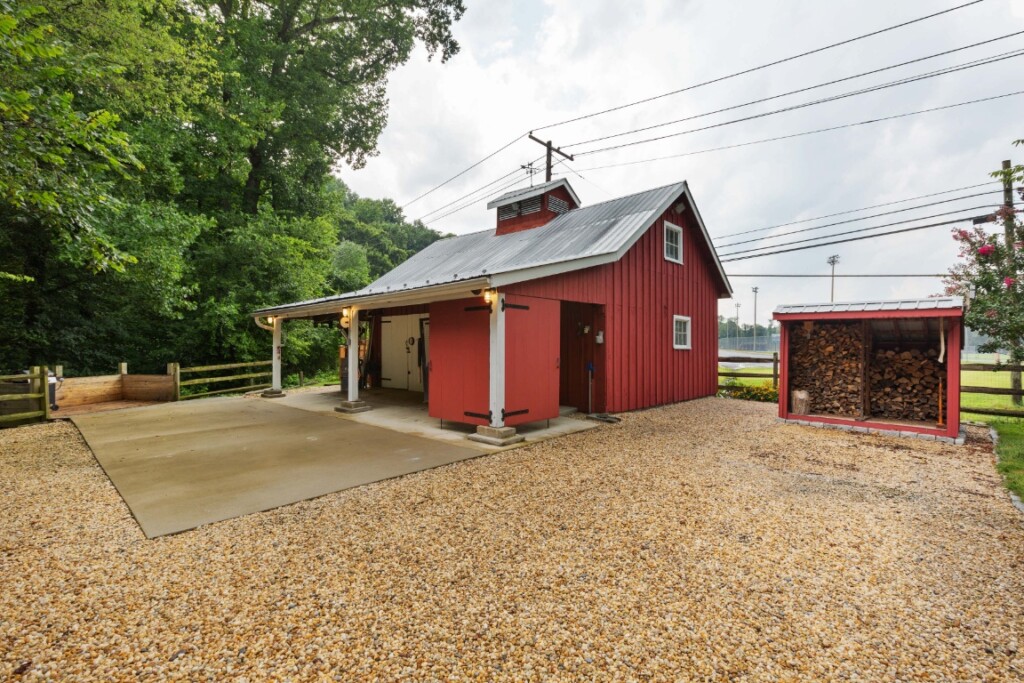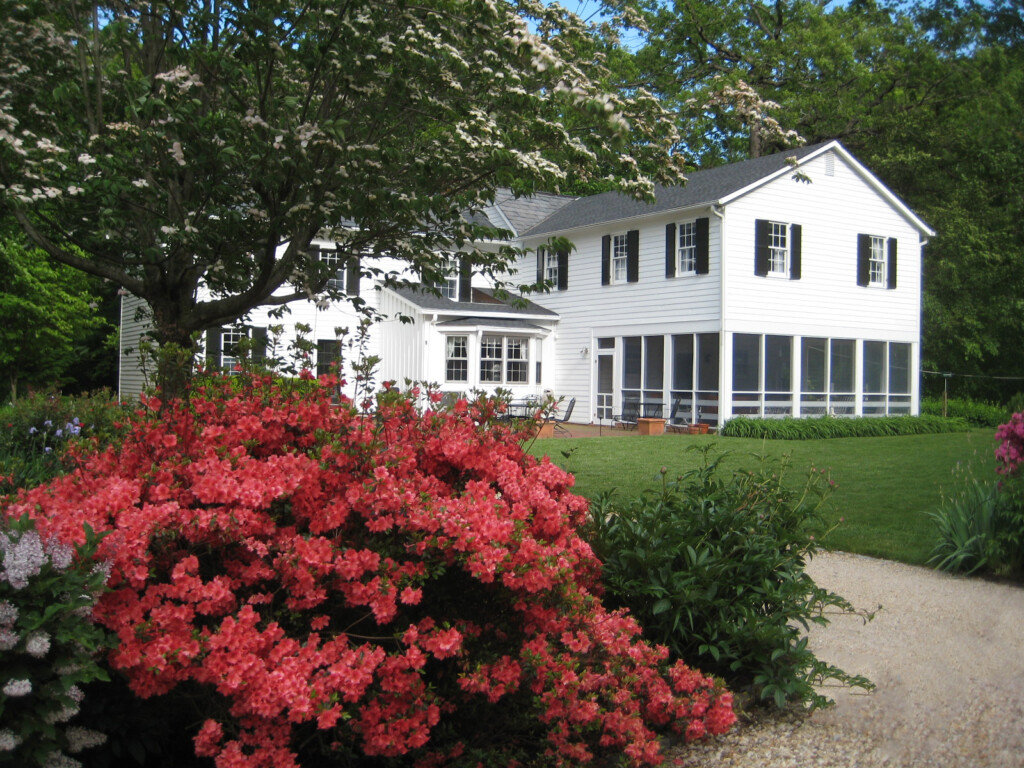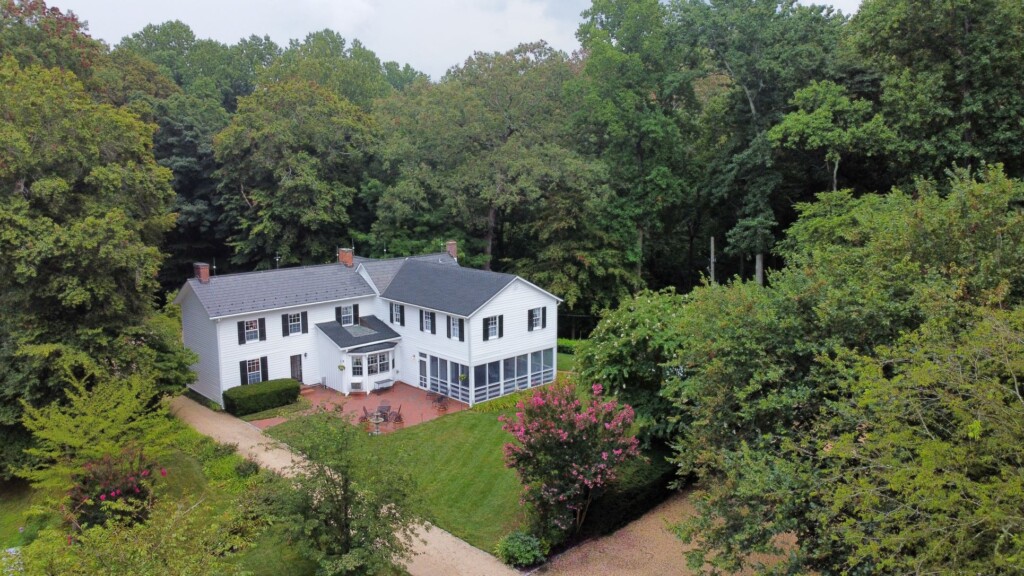Beds: 3Baths: 2.5
Estates, Farms, Homes
Please enter your username or email address. You will receive a link to create a new password via email.
Historic Beechmere c. 1870 (aka The Brooke-Herring House) is conveniently located in the charming community of Upper Marlboro and just minutes from downtown DC. This extraordinary home has been exquisitely restored and renovated, and includes 6 spacious bedrooms, original wood floors, fireplaces with mantels, historic detailing, luxurious bathrooms and dual staircases, and a large screened porch and adjoining patio, ideal for entertaining. Set on a beautifully landscaped 1.3 acre lot with a private yard backing to woods, this home features lush gardens, mature trees, a Koi pond, 2 story barn/garage with plenty of storage and a workshop, a kennel & so much more.
First time offered for sale in nearly 70 years, Beechmere presents a unique opportunity to own a piece of American history. This is a home of rare and beautiful distinction close to DC, yet a world away.

Entry Hall 17′ x 7′ – Wood floor, staircase, closet, rear door.
Parlor 17′ x 13′ – Wood floor, fireplace with wood mantel, chair rail, crown molding, ceiling fan, 2 windows.
Living Room 30′ x 13′ – Wood floor, crown molding, 5 windows (including bay window).
Dining Room 17′ x 12′ – Wood floor, chair rail, crown molding, door to side patio, 3 windows (include bay windows).
Family Room 13′ x 12′ – Wood floor, brick fireplace, built-in bookcase, wainscot, closet, 1 window.
Hallway 12′ x 7′ – Wood floor, back staircase, wainscot, hanging lamp.
Storeroom/Pantry 12′ x 10′ – Vinyl tile floor, wood paneling, closet, 1 window.
Kitchen 12′ x 10′ – Brick floor, custom wood cabinets, wood paneling, ceiling fan, door to screened porch, 2 windows.
Screened Porch – brick floor, 2 ceiling fans.
2nd Floor
Hall 7′ x 5′ – Wood floor, hanging lamp, 1 window.
Bedroom 1 17′ x 13′ – Wood floor, exposed wood beam ceiling, hanging lamp, 2 closets, fireplace with wood mantel, 2 windows.
Hall Bathroom 8′ x 6′ – Ceramic tile floor, ceramic tiled shower, linen closet, 1 window.
Bedroom 2 17′ x 13′ – Wood floor, wood paneled wall, 1 closet, ceiling fan, crown molding, built-in bookshelves, 2 windows.
Hallway 11′ x 8′ – Wood floor, back staircase, hanging lamp.
Bedroom 3 17′ x 12′ – Wood floor, 2 closets, ceiling fan, 3 windows (including bay windows).
Bedroom 4 12′ x 8′ – Wood floor, closet, ceiling fan, 2 windows.
Hall Bathroom 11′ x 9′ – Marble floor, bath tub, large vanity with marble counter, 1 window, private shower room with sink & marble shower, linen closet.
Laundry 9′ x 5′ – Vinyl floor, closet, cabinets.
Walk-In Closet 7′ x 6′ – Wood floor, 1 window.
Bedroom 5 20′ x 12′ – Wood floor, closet, ceiling fan, built-in bookcases, 3 windows.
Bedroom 6 17′ x 12′ – Wood floor, closet, ceiling fan, built-in bookcases, 3 windows.
Basement
Improved Cellar 20′ x 12′ – Concrete floor, shelving, utilities.
Outbuildings
Barn/Garage – 2 story, suitable for storage, workshop, cars…
Kennel – Small structure that includes fenced run and workshop.


The Brooke-Herring House (aka Beechmere) is a three-part frame house constructed in several stages in the nineteenth century. It stands as a prominent landmark at the western entrance of the Town of Upper Marlboro. The main block of the house was built shortly after the Civil War, and was enlarged in 1890 to serve as the Rectory of Trinity Church, Marlboro. In this century, it has served as a private residence.
The main block of the house was built circa 1870 by Augustine T. Brooke on two acres of land which he bought in that year from Dr. Frederick Sasscer. This two-acre lot was part of a 320-acre tract (including The Meadows and part of Weston) which the Sasscer family had acquired in the 1850’s. The house, which Brooke built, was a good example of the traditional frame I-house, with central stair hall flanked by one parlor on each side; it stood at the western entrance into the Town of Upper Marlboro, in the angle formed by the road to Weston (the plantation of the Clagett family) and the road to Croom and Nottingham.
Brooke served briefly as Clerk of the Prince George’s County Court in 1879; he lived with his family in the main block of the house until 1892 when he sold the house and two-acre lot to the Vestry of Trinity Church, the local Episcopal Church of which he was a member.
Before this time, the Rectory of Trinity Church had been located nearly a mile southwest of the Church on the road to Croom, but in June of 1892 the Vestry sold the old Rectory to James T. Coffren, and it was converted into a private residence. In September of 1892, the Vestry purchased Augustine Brooke’s home, with the intention of converting it into a Rectory for Reverend Charles Sontag, the Rector of Trinity Church who was installed in that same year. Construction was begun on the south addition in June of 1893 under the supervision of John Houtz of Washington, DC. The work was completed at a cost of $550 before the end of September 1893, and the Prince George’s Enquirer (the weekly newspaper printed in Upper Marlboro) stated “Now Trinity Church has a beautiful and commodious Rectory within the limits of the town.
The house served as the Rectory of Trinity Church until 1904 when it was resold to the Brookes. From that time, it served as the house of the Brooke, Cranford and Roberts families, until it was purchased in 1952 by the present owner’s father. Since that time, the present owner has reinforced and completed the foundation of the house, replaced the east porch with the present brick stoop, enclosed the rear porch to form a new kitchen and constructed the small barn in the west (rear) yard. The Brooke-Herring House is a noticeable landmark on the main road through the County Seat, near the western entrance to the Town. It is a good example of a Victorian vernacular I-house, expanded by a wing with Queen Anne style elements. It was built to be the home of a man who served as Clerk of the County Court; the house subsequently served for eleven years as the Rectory of Trinity Church. It is a handsome and well-kept dwelling with important historical associations.

The Brooke-Herring House is a frame house constructed in several stages in the nineteenth century. The main block was built circa 1870 by Augustine T. Brooke on two acres of land which he bought in that year from Dr. Frederick Sasscer. The house which Brooke built was a good example of the traditional frame I-house, with central stair hall flanked by one parlor on each side. Brooke served as Clerk of the Prince George’s County Court in 1879; he lived in the house until 1892 when he sold the house and two-acre lot to the Vestry of Trinity Church, the local Episcopal Church in Upper Marlboro; the church began the process of converting Brooke’s house into a residence for its newly installed Rector, Charles Sontag.
Construction was begun on the south addition in June of 1893, and completed in September. The house served as the Rectory of Trinity Church until 1904 when it was resold to the Brookes. From that time, it served as the home of the Brooke, Cranford and Roberts families, until it was
purchased in 1952 by the present owner. It is a noticeable landmark on the main road through the County Seat, and is a good example of a Victorian vernacular I-house, expanded by a wing with Queen Anne style elements. It is a handsome and well-kept dwelling with important historical associations.
Upper Marlboro, established in 1706 and designated the county seat in 1721, retains a collection of distinctive residential property types constructed between the early 18th century and the mid 20th century. Commercial development largely occurred around the government buildings located in the center of town, and the majority of residential development occurred outside the town center, to the west and north. The residential development that occurred in Upper Marlboro directly resulted from the town’s designation as a county seat in the 18th century and its continuance in that role to the present day. Furthermore, Upper Marlboro’s importance as a political, economic, social, and cultural center during the 18th, 19th, and 20th centuries influenced the construction of residential dwellings by citizens who desired to be within close proximity of the bustling town. The history of the Town of Upper Marlboro Residential Area is directly related to the history of Upper Marlboro as the center of the political, commercial, and social life for Prince George’s County. The district is historically significant for its association with community planning and development, as a notable collection of residential buildings that reflects development over time, from the 18th through the 20th centuries.
more…

LINKS
Maryland Historical Trust – PG: 79-45 Brooke-Herring House (aka Beechmere)
Historic District – Town of Upper Marlboro Historic District
Historic Sites – Prince Georges County
Historic Preservation – PG County Historic Preservation Commission
Historic Site – Prince Georges County Historic Preservation Commission
Tax Credits – PG County Tax Credits
Tax Credits – Maryland Tax Credits
Tax Credits – Federal Tax Credits
Plat – Survey of property
Updated on February 9, 2022 at 1:01 pm
Beds: 3Baths: 2.5
Estates, Farms, Homes
5 years ago
Beds: 3Baths: 2.5
Estates, Farms, Homes
5 years ago
Beds: 4Baths: 3
Estates, Homes
7 years ago
Beds: 4Baths: 3
Estates, Homes
7 years ago
Beds: 4Baths: 3
Homes
7 years ago
Beds: 4Baths: 3
Homes
7 years ago

